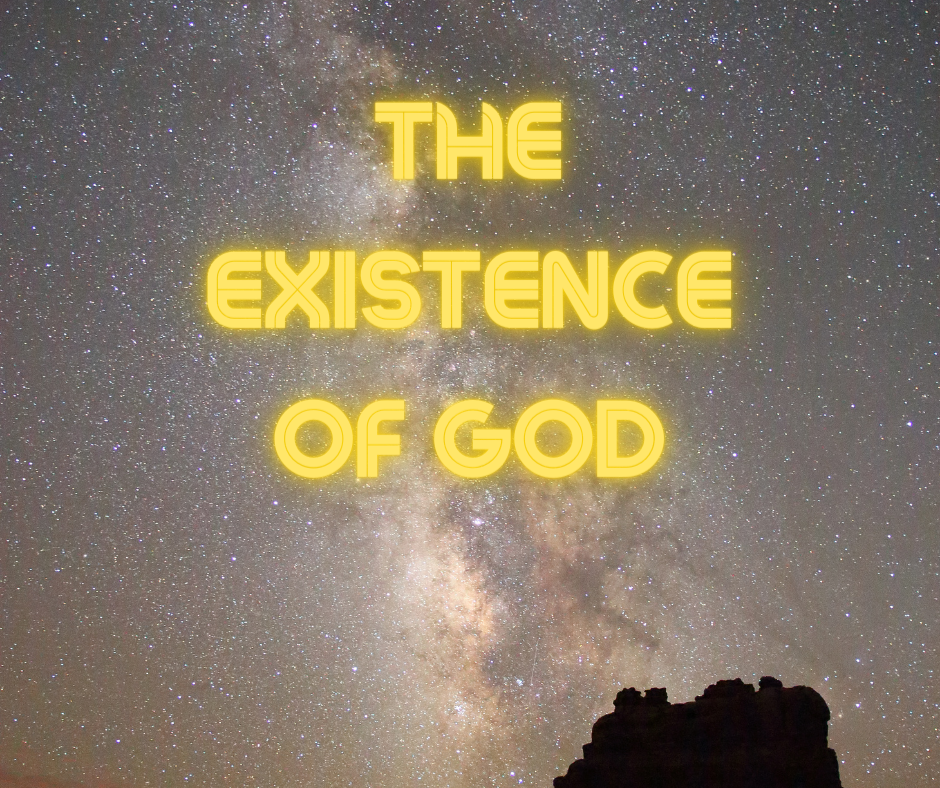The Existence of God
Written by: Hatton Allen
Four arguments for God’s existence
One must start with objective, empirical facts! If someone cannot do that, then no true progress will be made. It is with these 4 arguments that the arguments against God begin to fail.
1. The teleological argument
Something which possesses a design necessitates the possession of a designer.
A Definition
The dictionary qualifies the study of “teleology” as “the doctrine that the phenomena of organic life and development can be fully explained only by the action of design and purpose and not by mechanical causes” (Funk and Wagnall 695).
In a basic manner, the teleological argument addresses the area of design. Logically, one concludes that something which possesses a design necessitates the possession of a designer.
An objection
In his paper Hume’s Criticism of the Design Argument, Jeff Speaks brings forth several objections that David Hume brought forth. One objection is that there is a lack of evidence for the design argument. Speaks quotes Hume as saying, “that a stone will fall, that fire will burn, that the earth has solidity, we have observed a thousand and a thousand times; and when any new instance of this nature is presented, we draw without hesitation the accustomed inference” (Criticism of the Design Argument). Speaks quoted Hume further as saying “but how this argument can have place where the objects, as in the present case, are single, individual, without parallel or specific resemblance, may be difficult to explain” (Criticism of the Design Argument).
The Answer
Hume was a Scottish philosopher who denied the existence of God (“David Hume”). He contended that any religion based on miraculous testimony was not worth following (“David Hume”). However, one cannot discount the fact that the earth is very complex in nature. The fact that complexity involves a knowledge of how the complexities work is not something that should be ignored. How could something have evolved over billions of years and developed the complexity it possesses?
2. The moral argument
There is a conscience within each of us that cannot excuse heinous acts, such as the atrocities committed by the Nazis in World War II.
A Definition
The basic premise of the moral argument is the existence of objective right and wrong.
An Objection
Some would object to this argument by saying “I’m a moral person and I don’t believe in God. Are you saying that atheists can’t be moral?” (Common Objections).
The Answer
Of course, the answer to this argument would be no. Just because someone proclaims to be an atheist does not mean the person is immoral. However, that does not excuse the fact that a higher law exists. There is a conscience within each of us that cannot excuse heinous acts, such as the atrocities committed by the Nazis in World War II. If value is only a function of the human mind, then the Nazis were absolutely justified in what horrible acts they committed by legalized genocide. Even Flew in his debate with Warren could not address this argument with any solidarity whatsoever. When it came up, it seemed as though Flew just shrugged off the argument and went to another subject matter. Warren stated it very clearly in his debate that “some men who are given questions in such a discussion do not answer them because they do not know how to answer” (Warren 74).
3. The cosmological argument.
Nothing randomly produces something, ever!
A Definition
The basic premise of the cosmological argument is that God is the first cause for everything. The argument is comprised of causes and effects.
Objection #1
An objection which Cleanthes offered was “why may not the material universe be the necessarily existent being?” (Objections to the Cosmological). Of course, it seems that Cleanthes is operating under the assumption that the cause of all the things within this world is the mere existence of the physical world. It is under that premise that the assumption must be made that evolution is the line of thought which Cleanthes follows.
The Answer
If it is true that the premise is evolutionary in nature, one must ask how the elements got here that formed the earth. As we know, nothing randomly produces something, ever! The very thinking that such could occur is irrational.
Objection #2
Another objection posed by Hume was “the universe might have existed for eternity, and this infinite series does to require an additional cause or explanation that it outside the series” (ibid). The series in its entirety begs the question of origin, Mr. Hume.
The Answer
If everything existed from eternity, then it would indicate order, but the second law of thermodynamics does not allow that premise.
4. The ontological argument
A Definition
The study of ontology, according to Funk and Wagnall, is “the branch of metaphysics dealing with the philosophical theory of reality” (457).
An Objection
It was Gaunilo who posed the objection of a perfect island. With this objection he stated, “the perfect island must exist, for if it did not then it would be possible to conceive of an island greater than that island than which no greater can be conceived, which is absurd” (Objections to the Ontological).
The Answer
First off, even if someone could conceive of a great island which is perfect, that is only a function of the specific person’s mind. If someone else comes along and conceives of an island which they think is great, that island would be great, because it is a function of the person’s own mind.
Conclusion
The existence of God is a subject which remains highly discussed in philosophical arenas. It is from this subject that debates arise, doctoral dissertations are created, and many scholarly works are born. However, though much is in circulation on this subject, different opinions are published.
Sadly, there are many in this world who still proclaim an absolute knowledge that God does not exist. Those who make such claims refuse to acknowledge the many evidence which abide in contrast to this idea.

Hatton Allen
I am twenty-three years old and currently work as one of the Associate preachers at the Willette Church of Christ. I am currently working toward a Bachelor of Science in Ministry/Bible from Amridge University. I am also working on a Master of Biblical Studies degree from the Bear Valley Bible Institute. In addition to my work in ministry, I also am one of the writers in Collaborators for Christ, a group devoted to the writing of teaching hymns for the Lord’s church. It is my hope that all articles will be used to edify the saints and glorify God.

Applications of Jesus’ Example Prayer
Prayer is such an important part of our Christian walk. It is our way of communicating with our Heavenly Father. So, do not neglect it. Pray to Him. Talk to Him. Use the aspects we identified in Jesus’ example prayer to guide you in your prayers.

Are We Speaking Where the Bible Speaks? Part 1
There is an important question that needs to be addressed, and that question is “Are we speaking where the Bible speaks?”

Boundaries in Christianity
Take a moment to think on areas of your life where you may already have boundaries set to help keep yourself closer to God. Also, take some time to consider areas of weakness that you may be able to develop boundaries for to help keep you distanced from tempting situations and more focused on sticking to the path of righteousness.

